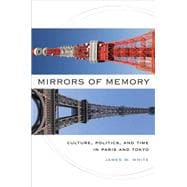
Note: Supplemental materials are not guaranteed with Rental or Used book purchases.
Purchase Benefits
Looking to rent a book? Rent Mirrors of Memory [ISBN: 9780813930701] for the semester, quarter, and short term or search our site for other textbooks by White, James W.. Renting a textbook can save you up to 90% from the cost of buying.
| List of Tables and Figures | p. vii |
| Preface | p. xi |
| Introduction | p. 1 |
| Views of the Capital: Walking and Reading the City | p. 27 |
| Form and Pattern in the City | p. 44 |
| From Center to Periphery | p. 79 |
| The Manipulated City | p. 104 |
| Monuments and Commemorations | p. 132 |
| The Capital Envisioned | p. 151 |
| Capital, Context, Country | p. 181 |
| Conclusion | p. 209 |
| Notes | p. 231 |
| Bibliography | p. 259 |
| Index | p. 275 |
| Table of Contents provided by Ingram. All Rights Reserved. |
The New copy of this book will include any supplemental materials advertised. Please check the title of the book to determine if it should include any access cards, study guides, lab manuals, CDs, etc.
The Used, Rental and eBook copies of this book are not guaranteed to include any supplemental materials. Typically, only the book itself is included. This is true even if the title states it includes any access cards, study guides, lab manuals, CDs, etc.